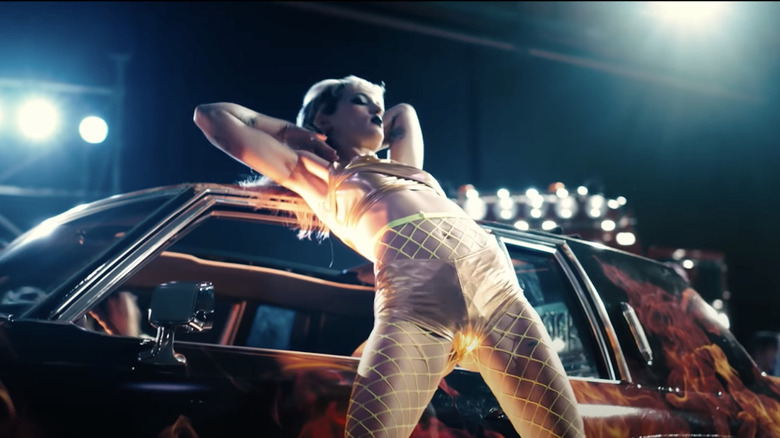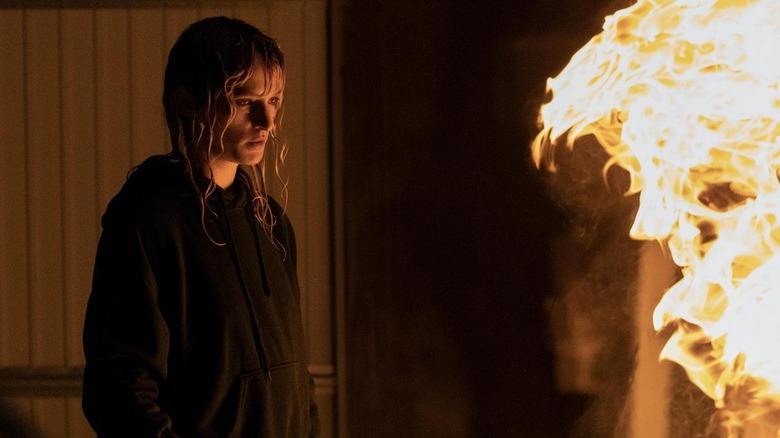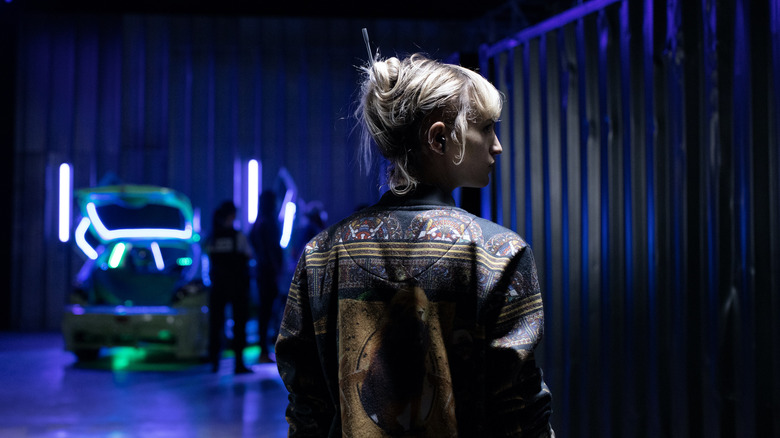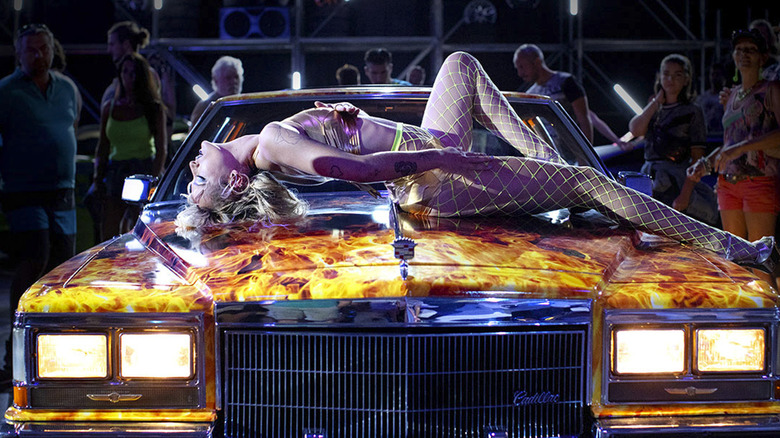Titane Star Agathe Rousselle On Humanizing A Psychopath [Interview]
Agathe Rousselle is a discovery. A tightly wound ball of rage and violence in "Titane," Rousselle has the heavy burden of carrying the wild, twisty film — and she has to do it without uttering a word for large stretches of the film. A former model, Rousselle makes her feature film acting debut in "Titane," for which she was given an acting crash course by writer-director Julia Ducournau herself. But the way that Rousselle speaks about it, it was no big deal.
"We prepared so much for that, that it was just like, 'Okay, I'm just going to do it now,'" Rousselle told me in an interview following the New York Film Festival screening of "Titane."
But Rousselle's performance is no easy feat — it's an immensely physical showcase from the actress, who not only has to erotically dance, but also fight, attack, and of course, communicate solely with her extremely intense gaze.
"You just have to be even more present. That's it," Rousselle said. "Because if you're in your head, there's no words to support whatever you have to say, so you just have to be very present."
I chatted with Rousselle about making her feature film acting debut in "Titane," playing with gender norms, and what exactly makes a psychopath.
"Because it's going to be on camera, you get this adrenaline coming up."
So this is your first feature film. I know Julia specifically casted you for this part. Can you speak about how you prepared and worked together to prepare for the role?
So there was a physical aspect of the preparation where I had to train with a coach and a dancer and stunt artist, and there was also this acting preparation where I watched everything I basically could watch on YouTube about psychopaths. Everything from TED talks, to archives, to movies, everything. And also we worked with a director on a range of emotions. Working on different kinds of monologues from movies, like from "Network," from "Twin Peaks," from "Killing Eve." That was very dense.
Like a film school almost?
Yes.
So there's an immense physicality to your role. What was the most difficult part of portraying Alexia, in either the dancing scenes or in the violence?
What was the most difficult?
Yes, what was the most difficult part?
It was not so much like the very spectacular things, because I prepared so much for them. No, what was probably harder was where she's suffering a lot, like being pregnant, the giving birth scene also, but it was mostly like when there's a lot of suffering. That was probably the worst. Not the worst, but it was just the most difficult probably, because everything that's very, "Wow." Like the dance and the sex scene and everything. We prepared so much for that, that it was just like, "Okay, I'm just going to do it now."
So it was kind of like second nature when you actually got to film it?
Yeah. I've done it so many times before that I was just like, "Okay, it's just that this time it's going to be on camera." It's not just that. Because it's going to be on camera, you get this adrenaline coming up. It was mostly like the part that don't look that hard, because when you suffer and everything, your whole body needs to be so tense. And the breathing, you kind of have to hyperventilate all the time. So you get sometimes a little dizzy. So that was probably the most difficult.
Were you able to draw from any real life experience for that? Or is that something that you just had to completely create?
No, I went through panic attacks in my life, so it was kind of the same, where your breath is just out of control. But when I act, I just don't think about personal experience. I think about exactly what I am doing in the moment. If I have to cry, or if I have to look like I'm stressed, or look like I'm in pain or super happy, I don't want to think about personal sh*t, because I also feel it's like putting healthy boundaries between me and the characters because it's a job. It's like in any job. You have to put a boundary between your personal life and your work life. So what I do to be able to act is just being extremely present and into what I'm doing right here right now. That's what I'm working on.
"Because if you're in your head, there's no words to support whatever you have to say, so you just have to be very present."
So there are large stretches of the film where you have no spoken dialogue. What was the challenge of performing without speaking?
Oh, you just have to be even more present. That's it. Because if you're in your head, there's no words to support whatever you have to say, so you just have to be very present. That's the key.
Can I ask about all of the dance scenes? Some of them were choreographed, I'm assuming, but were all of them choreographed? Were some of the even more looser ones, like towards the end more...
The one with Vincent [Lindon] were not. We rehearsed them before, but it wasn't choreographed. But then what I do on the first scene in the car and what I do up on the fire truck, those were both choreographed before, but the rest not.
So your body, as your character, goes through immense change too. How did the effects get pulled off, for example, with the motor oil leaking out of your body or your body becoming part metal? So was that all practical effects or were there digital effects added?
All these things where you see the metal things, that was special effects. I didn't see that on set, but basically, at the end of the movie, I'm covered in prosthetics, like the fake belly. At some point, I have fake boobs as well, because when you get pregnant, you have bigger boobs. But I have fake nose, fake scar, fake eyebrows, fake eye socket. It's not my body, basically. But about my body, since the beginning of shooting, I understood pretty early on that my body was not going to belong to me for two months. That was very clear in my mind. So I let go of this, and I think it was for the best, because if I had been like, "This is my body. What's happening to my body?" It would have been like impossible. It would've been such a source of suffering. It would've been impossible to do it.
What was it like playing that? Those two kind of bodies that you have in the film? The heavily pregnant one and also the more androgynous at the end and how he acts and how he holds himself?
In my personal life, I've always played with... Because of the jobs that I got, as a model or sometimes acting even, just because I'm a woman and I identify as such, but if you're a woman, you know that if you walk in the street late that night to walk your dog, you are not very safe. So because I'm tall and I've always had short hair, I've learned how to dress and walk a certain way so that people think I'm a guy, and I never have any problem. Knock on wood. But I know how to make people think that I could be a guy. It's mostly out of survival, just like Alexia in the movie.
"I wish this film could also make guys, most guys, men understand that women can be very strong."
I was talking to Julia, and she told me about how this film, she considers it more about fatherhood than about motherhood, despite your character being heavily pregnant. But it's about the character dynamic between Alexia and Vincent and then how they are able to come together as people who are just woefully unsuited to their own lot in life. So what do you think of that idea of fatherhood and motherhood in this film?
I think what's interesting is that in the movie, we can see something that we never really talk about, which is a woman that's pregnant and doesn't want to be pregnant. It's very taboo. We never talk about that. But sometimes women don't want to be pregnant, but for some reason, they can't get an abortion and they keep the kid. Or they want a kid and they give birth and they just don't want to be a mom. So I feel like it tackles this part of being a mom, or maternity of this ability that we have to give birth as women, and sometimes you just don't want to. It's not because you're pregnant that you should be happy about it. You know what I mean? So that's the important thing about being a mom or about maternity that it's important to me to show that, no, being pregnant is not necessarily good news. I think it's important.
But then about being a dad, yes, but also with Vincent, it tackles paternity, but they also have this kind of love story. They kiss at the end. It's not that clear. It's very ambiguous. But he is a dad who lost his son, and that's why he says at some point, "I don't care who you are. To me, you're my son." Because he needs a son so bad. He needs to be a dad, because this guy is so lost and so broken. He needs to find someone to be again, and I feel like being a dad was his favorite thing probably.
I feel like a lot of films of the genre, like body horror films and horror films, are about violence against women, but "Titane" is about the violence inherent in the female body, both in pregnancy, but also how she becomes a weapon of some kind, but also that transformation from a weapon into something new, through love.
That's very true. That's a good point of view. I wish this film could also make guys, most guys, men understand that women can be very strong, and women could kill them too, and they could get raped as well. I hope not, but you know what I mean? Men would always assume that women are weaker, which physiologically is generally true, but a woman your size could be a deadly weapon as well. You just need the skills.
And I wish watching this movie, some men would be like, "Ooh, maybe I don't follow that woman around in the street at night, because I don't know, maybe she has something in her hair and is just going to put it in my ear and kill me." So I hope the way violence is brought up in the movie is going to hopefully make people think, "Yeah, women can also be a threat."
"Titane" is playing in select theaters now.



